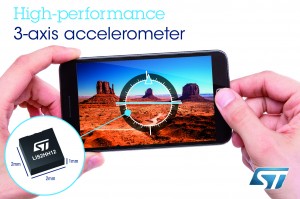Innovative design boosts the sensor’s thermal and mechanical stability to deliver robust high performance in ultra space-saving footprint
India, December, 2013 – STMicroelectronics , a global semiconductor leader serving customers across the spectrum of electronics applications and the leading supplier of MEMS (Micro-Electro-Mechanical Systems) devices for consumer and mobile applications[1], has unveiled its new state-of-the-art high-performance MEMS accelerometer engineered to withstand increasingly challenging conditions inside the latest smartphones and other portable devices.

With today’s processing-intensive mobile apps and super-slim handset designs, portable electronics are more vulnerable to thermal variation and bending. As OEMs push to deliver new models supporting ever more precise, stable and responsive movement sensing for features such as inclinometer, gesture recognition, gaming, artificial horizon in cameras, indoor navigation, and augmented reality, ST’s new LIS2HH12 3-axis accelerometer introduces an innovative mechanical structure and dedicated processing to deliver consistent and stable high performance in thermally challenging conditions inside ever-slimmer portable applications.
“The innovative architecture of our new accelerometer represents a significant advance in the design of MEMS devices,” said Benedetto Vigna, Executive Vice President, General Manager, Analog, MEMS & Sensors Group, STMicroelectronics. “This next-generation device addresses the need of the mobile industry for higher performance and stability in advanced motion-sensitive applications.”
The LIS2HH12 is housed in an ultra-small 2mm x 2mm x 1mm package, giving designers extra flexibility to meet pc-board layout rules for wireless handsets, and helping achieve a low overall handset profile. The accelerometer has selectable full-scale range of ±2, ±4 or ±8 g and a 16-bit digital output, an integrated temperature sensor, industry-standard I2C and SPI interfaces, a wide analog supply-voltage range of 1.71V to 3.6V, and two programmable interrupt generators that help streamline system design. With typical Zero-g level change versus temperature of ±0.25mg/C, the stability of the LIS2HH12 has improved twice compared with the previously announced devices. Also, the rejection versus bending with a typical offset accuracy of ±30mg has improved by 25% over the existing solutions.
In addition, the LIS2HH12 is board- and software-compatible with ST’s recently announced LSM303C 2mm x 2mm MEMS eCompass module, enabling OEMs to create differentiated handset products economically by leveraging common hardware and software. Alternatively, the LIS2HH12 accelerometer can be used with ST’s LIS3MDL standalone magnetic sensor to create an eCompass using discrete components.
Engineering samples of the LIS2HH12, in the 2mm x 2mm x 1mm LGA-12 package, are available now. Volume production is expected to start in Q1 2014, with unit pricing at $0.90 for quantities of 1,000 pieces.






